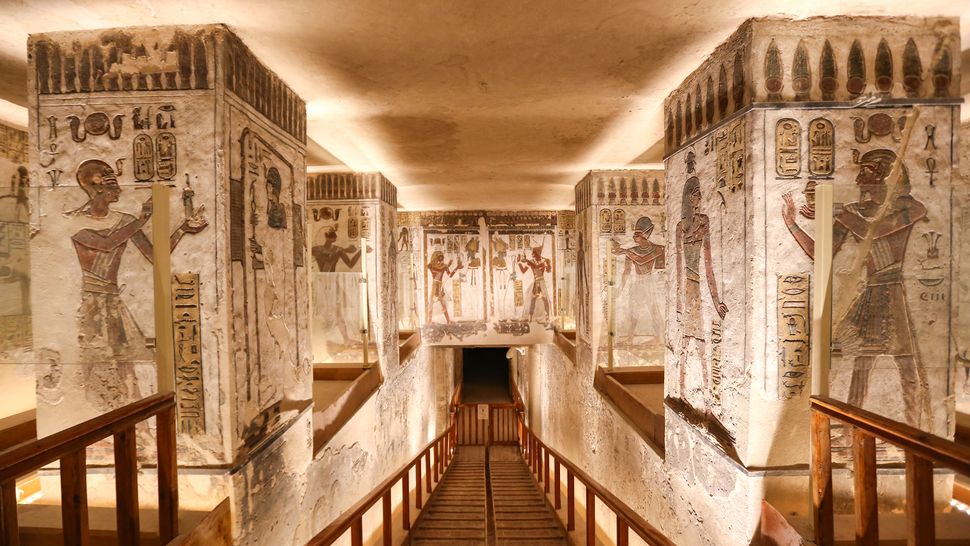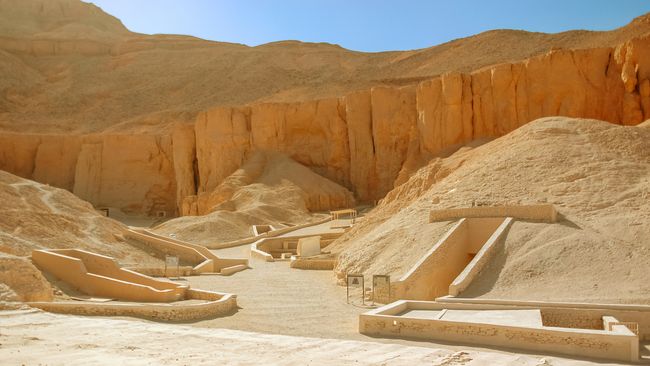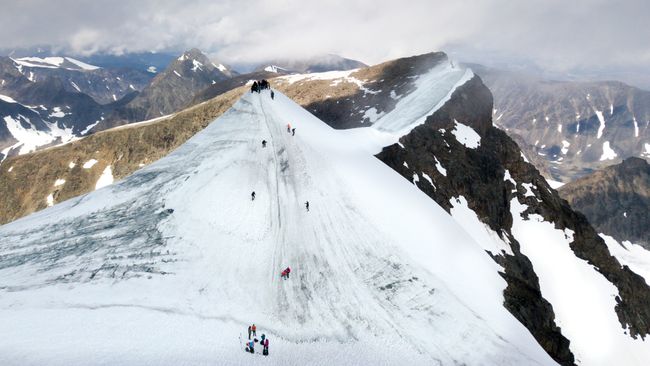Judi Lynn
Judi Lynn's Journal5 Big Archaeology Discoveries to Watch for in 2020
By Owen Jarus - Live Science Contributor 14 hours ago

(Image: © Shutterstock)
New discoveries in the Valley of the Kings, looted art from Venezuela and evidence that humans were in Central America more than 20,000 years ago are just some of the stories Live Science will be watching out for in 2020.
Tombs of pharaohs and queens in Valley of the Kings

(Image credit: Shutterstock)
Egypt's Valley of the Kings, which holds the tomb of King Tut and other Egyptian royalty, divulged several of its secrets in 2019, including a workshop complex, mummification cache, ostraca (pottery with writing on it) and newfound mummies. Excavations were carried out in both the east and west valleys of the Valley of the Kings and was funded in part by media companies that are paying for the right to film the excavations.
Excavations in the east and west valleys of the royal cemetery are ongoing; the artifacts found in 2019 are still being analyzed, and hieroglyphic writing on the ostraca is in the process of being deciphered. With all this work going on, it's likely that more discoveries will be made in the Valley of the Kings in 2020. Zahi Hawass, the former Egyptian antiquities minister who is leading work in the valley, believes that several tombs built for the pharaohs and their queens have yet to be found.

(Image credit: Shutterstock)
The melting of permafrost in the Arctic and sub-Arctic is causing the remains of both humans and animals to thaw and decompose, giving local inhabitants a smelly problem to deal with.
More:
https://www.livescience.com/archaeological-discoveries-to-watch-for-2020.html
Smelly problem ahead
Colombia announces resumption of aerial fumigation of coca, again
Colombia announces resumption of aerial fumigation of coca, again
by Adriaan Alsema January 1, 2020
Colombia’s government on Monday announced the resumption of the controversial aerial fumigation of coca with glyphosate for the second time in a year.
The use of glyphosate in areal spraying of coca is fiercely opposed by the leftist opposition, which wants to ban the chemical, but won’t return from its Christmas recess until March 16.
According to the Justice Ministry, “the reactivation of the spraying would increase the capacity of the Colombian state to confront drug trafficking, in less time and in a more effective way.”
Local counter-narcotics experts and the United Nations Office on Drugs and Crime have dismissed the method as ineffective and a waste of money.
The US State Department, however, welcomed the initiative on Tuesday, saying the decree was “a critical step toward integrating aerial coca eradication into Colombia’s comprehensive counternarcotics strategy.”
More:
https://colombiareports.com/colombia-announces-resumption-of-aerial-fumigation-of-coca-again/
Palm oil, fire pushing protected areas in Honduras to the 'point of no return'
by Leonardo Guevara, Lesly Frazier on 30 December 2019 | Translated by Sarah Engel
Residents of the community of París de Leán in Honduras say they have been dealing with dirty water for a decade. To demonstrate this, Concepción Aguilera dips a dish into the well that he built outside his house. Instead of fresh water, a rotten yellow liquid fills the container.
Even the public well that was built by the community only provides dirty water. París de Leán residents say they need to transport water into their community from other areas in order to survive.
Surprisingly, París de Leán, which is located in the Atlántida department in northern Honduras, is in a fertile valley with abundant water reserves. However, although water is naturally plentiful around París de Leán, the growth of the oil palm industry in the area has sparked concerns about water scarcity and land use. Aguilera pointed out extensive oil palm crops on land that he said once held a green forest filled with animals. The crops are owned by the Dinant Corporation, a Honduran company founded in 1960 by Miguel Facussé Barjum.
The beginning
About forty years ago, Concepción Aguilera’s father, José Aguilera, heard that northern Honduras had abundant sources of water, which made it easy to grow rice and corn. With high expectations that were mostly fulfilled, their family moved to northern Honduras from the southern part of the country. José Aguilera joined a small cooperative that owned the land. His family had access to housing, work, food, and education.
More:
https://news.mongabay.com/2019/12/palm-oil-fire-pushing-protected-areas-in-honduras-to-the-point-of-no-return/
~ ~ ~

Miguel Facussé Barjum.

(Sitting on the right hand of Honduran President Porfirio Lobo)
Honduras: The Impunity and Legacy of Miguel Facussé
Written by Greg McCain
Monday, 24 August 2015 10:20
Ciriaco de Jesús Muñoz, PRESENTE! Ignacio Reyes García, PRESENTE!; Raúl Castillo, PRESENTE!; Teodoro Acosta, PRESENTE!; José Luis Sauceda Pastrana, PRESENTE!.
These are the names of the five campesinos (peasant farmers) who were massacred in November of 2010 at El Tumbador. Francisco Ramirez calls out the names to begin a meeting with a human rights delegation. The group calls out “PRESENTE!” to show that each of the five is still a part of the community of Guadalupe Carney and a member of the Campesino Movement of the Aguán (MCA in its Spanish Acronym).
November 15th 2015 marks the fifth anniversary of the massacre at El Tumbador, the African Palm plantation on Laguna Guaimoreto in Trujillo, Colon. Paramilitary private guards and members of the military ambushed the five, along with several other campesinos from the community, in the early morning hours as they attempted to enter their property. Francisco was among those severely wounded as bullets tore through his face and body. He is left with constant pain that makes it next to impossible for him to work plus the fact that the land he was entitled to cultivate was stolen from him.
November 15 also marks five years of impunity for the Dinant Corporation whose President, Miguel Facussé Barjum, ordered his private security guards and State security forces to open fire on the campesinos and kill as many as possible. Dinant is a Honduran company that grows African Palm and processes the oil in addition to harvesting other crops. It distributes cooking oil, snack food, sugary juices and a variety of other junk food and household products nationally and internationally. It also has a Biofuel processing program that is set up more as a PR scam for receiving Carbon Credits than as a feasible alternative fuel producer.
Facussé died in June of this year. He was considered one of the richest men in Honduras and the 11th richest in Central America. His death ensured his impunity for various crimes. He made his money swindling banks and other companies and used his influence in the government to have agrarian laws changed in order to swindle, intimidate, and usurp land from peasant farmers in various sectors throughout Honduras. One of his largest land holdings were the African Palm plantations in the Northeastern region known as the Bajo Aguán. It was here, since the 1990’s, that he wreaked havoc on the lives of the peasant farmers. Facussé left a legacy of murder, embezzlement, and theft much of it with the full knowledge and tacit approval of the US government.
More:
http://upsidedownworld.org/main/honduras-archives-46/5443-honduras-the-impunity-and-legacy-of-miguel-facusse
~ ~ ~
March 10, 2017
World Bank-funded Dinant Corporation Implicated In Drug Trafficking .... Again
Honduras is being shaken up by a court case in the New York Southern District Courts against Fabio Porfirio Lobo, the son of ex-Honduran President Porfirio "Pepe" Lobo. On Monday, March 6th in New York, a witness called by the Drug Enforcement Administration (DEA) in Lobo's case, Devis Leonel Rivera Maradiaga, implicated various Honduran politicians and elite in the drug trafficking activities of Rivera Maradiaga's drug cartel Los Cachiros. Rivera Maradiaga is one of the leaders of the Los Cachiros cartel that was identified by the United States Treasury in September 2013 as a "drug trafficking organization."
Testifying before a Federal Judge, Rivera Maradiaga criminally implicated former Honduran President Porfirio Lobo, his brother Ramon Lobo, his nephew Jorge Lobo, the current Security Minister Julian Pacheco, two Congressmen - Congressman Oscar Nájera for the department of Colon and Congressman Fredy Nájera for the department of Olancho - and the LIBRE mayor of Tocoa, Adán Funes. Rivera Maradiaga also mentioned the well-known Facussé family that owns the Honduran company, Dinant Corporation.
Below is a translation of an article published by UniVision written by Juan Cooper that outlines Rivera Maradiaga's mention of Dinant Corporation and how the World Bank-funded Dinant Corporation has been ONCE AGAIN implicated in drug trafficking activities in Honduras.
Drug Traffickers Used Landing Strip of Honduran Millionaire Businessman According to Witness in US
From UniVision News online
By: Juan Cooper, March 9, 2017 9:03 pm
A confessed Honduran drug traffickers said to have received a metric ton of cocaine on landing strip of the powerful Facussé family.
More:
http://www.aquiabajo.com/blog/2017/3/10/world-bank-funded-dinant-corporation-implicated-in-drug-trafficking-again
Profile Information
Member since: 2002Number of posts: 160,515